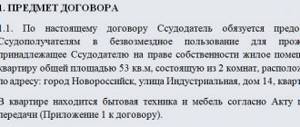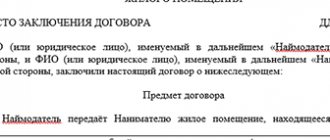Real estate, in particular non-residential premises, are the subject of civil legal relations. Non-residential premises are a building (or part thereof) suitable for use for industrial or commercial purposes. Often individual entrepreneurs, individuals or legal entities (usually charitable and non-profit organizations) do not have the opportunity to purchase or rent suitable premises. For such cases, the law provides for the conclusion of agreements for the gratuitous use of non-residential premises (Civil Code of the Russian Federation, Art. 689).
Contract term and premises requirements
The contract is concluded for a specific or indefinite period (Civil Code of the Russian Federation, Art. 610, paragraphs 1, 2). If the documents do not stipulate the end date for the use of the property, then the agreement loses its force three months from the moment one party warns the other about the desire to terminate cooperation.
According to Article 691 of the Civil Code of the Russian Federation, the transferred premises must meet the requirements specified in the contract and be suitable for use for its intended purpose. Otherwise, one of the parties is subject to certain obligations to bring the premises into an appropriate form in accordance with the purpose specified in the contract.
Along with the contract, the user is given technical and legal documentation (technical passport, floor plans, statutory documents) for the premises used.
If such documentation is not transferred, but it is necessary for the operation of the property, the user has the right to demand that the lender provide documents. In case of refusal, the borrower may raise the issue of terminating the agreement and covering actual losses.
Usual terms of the Agreement for the gratuitous use of non-residential premises (standard form):
(conditions that the parties, in order to prevent possible risks and disagreements, by virtue of the right granted by law and (or) business customs, independently determine in the Agreement for the gratuitous use of non-residential premises):
- conditions that detail the characteristics and description of both non-residential premises and movable property, if non-residential premises equipped with movable property (for example, with furniture, appliances, etc.) are transferred, which allows the requirements for the quality, quantity and range of the transferred property to be agreed upon by contract for a property loan;
- information about the presence or absence of rights of third parties to non-residential premises (encumbrances and (or) restrictions) and, if there are rights of third parties, execution of the necessary consents in accordance with the forms provided
- for the Lender who is an individual - a guarantee of the absence of marital relations or registration of the necessary consent of the spouse to transfer the common property of the spouses for a loan in accordance with the submitted form;
- the purpose and (or) purpose of the Borrower’s use of non-residential premises;
- the term of the loan, and if this period is defined as one year or more, then the procedure for state registration of the right of use is also determined;
- the procedure for transferring non-residential premises to third parties on loan, if it is not specified in the agreement, then the Borrower has the right to transfer non-residential premises for free use to third parties only with the consent of the Lender;
- expenses for maintaining non-residential premises (for example, utilities, payments for maintenance of non-residential premises, security, communications, etc.) - are paid depending on the choice of the user by the Lender or the Borrower;
- when the Borrower pays the above expenses, the agreement also regulates the procedure, timing and form of payment for such expenses;
- liability of the parties;
- settlement of disputes;
- procedure for changing or terminating the contract;
- conditions that make it possible to conclude an agreement either in simple written form, or the decision of the parties to notarize the agreement, and depending on this, different procedures for state registration of the right of use:
- one of the parties, if the parties notarize the agreement;
- by both parties, if the parties enter into a simple written agreement.
- other conditions that the parties, by virtue of the right granted by law and (or) business customs and (or) agreement of the parties, can independently determine in the contract.
According to the Federal Law “On Information, Information Technologies and Information Protection”, when providing confidential information, it is necessary to obtain consent to access such information.
Responsibility of the parties and sample agreement
Sample agreement for the gratuitous use of non-residential premises
In addition to the agreement, the parties draw up and sign an act of acceptance and transfer of the transferred object. It indicates the state of the transferred object. If the transferring party has hidden any defects that prevent the property from being used for its intended purpose, it is still fully responsible for these defects.
The user, if defects are detected, has the right to demand their elimination or reimbursement of their costs for their elimination. The transferring party is not responsible for those defects that were discovered during inspection and indicated in the acceptance certificate. The signing of the transfer and acceptance certificate certifies the actual transfer of property from one party to another. Without it, the main agreement is only preliminary.
After the transfer of property for free use, further responsibility for the condition of the premises lies with the user (Civil Code of the Russian Federation, Art. 695). He is obliged to maintain the facility in proper condition, make all types of repairs, and pay all costs for the maintenance and operation of the property.
During the validity of the contract for the gratuitous use of non-residential premises, the parties to the transaction may change. The transferor may change the owner, while he is the legal successor of the previous owner. In this case, the borrower’s right to use the premises does not cease (unless otherwise specified in the agreement). In the event of the owner's death, all his rights and obligations pass to his heirs.
Parties to the Agreement for the free use of non-residential premises (standard form):
- Lender - an individual or legal entity, or an individual entrepreneur who owns non-residential premises by right of ownership, and which he undertakes to transfer for free temporary use (loan) to another party (the Borrower) .
At the same time, in relation to legal entities, namely commercial organizations, the law prohibits the transfer of property for free use to persons who are its founder, participant (shareholder), director, member of its management or control bodies.
- Borrower is a person (individual or legal entity, or individual entrepreneur) who undertakes to accept non-residential premises for free temporary use (loan). Wherein:
The main obligation of the Borrower is to use the subject of the agreement in accordance with the terms of the agreement or in accordance with the purpose of the non-residential premises; the consequence of failure to fulfill this obligation is the Lender’s right to demand termination of the agreement and compensation for losses.
After the expiration of the agreement, the Borrower undertakes to return the same non-residential premises to the Lender in a condition suitable for further use. The condition of the transferred non-residential premises must correspond to the condition in which it was transferred (taking into account wear and tear during operation.
Registration of the agreement
According to Article 689 of the Civil Code of the Russian Federation, state registration is not required for this type of agreement. The conclusion of an agreement for the gratuitous use of non-residential premises between business entities greatly facilitates the implementation of their activities.
The positive aspects of this document are its free nature, simplicity of conclusion and simple rules for its regulation, enshrined in the Civil Code of the Russian Federation.
The downside can be considered the risks associated with the operation of the facility, assigned to the transmitting and receiving parties. For the user, these costs are reduced due to the free use of the property. The transferring party reduces its liability through regular inspections and constant monitoring of the condition of the transferred property.
(Size: 53.0 KiB | Downloads: 2,191)
See also:
- Agreement for free use of residential premises It would seem, why document the conditions for using an apartment if it...
- Agreement for the free use of a car Most companies need transport to carry out their work. Often…
- Agreement for gratuitous use of a land plot In civil law there is a clear interpretation of a loan agreement, a type of which...
- Collective liability agreement Collective liability is introduced when it is impossible to differentiate the responsibilities of employees...
- Agreement on individual financial responsibility When concluding a standard employment contract, in addition,…
- Lease agreement for non-residential premises A lease agreement for non-residential premises is a document that is a written…
- Property Pledge Agreement The condition that secures the loan agreement is an agreement stipulated by both parties...
- Property rental agreement Many aspiring entrepreneurs and small businesses do not have the opportunity…
- Pledge agreement between individuals It is not always possible to get a loan, loan or credit in…
- Agreement for the provision of free services Today, the agreement for the provision of free services is one of...
Essential terms of the Agreement for the free use of non-residential premises (standard form):
(conditions without which, by virtue of legal requirements, the Agreement for the gratuitous use of non-residential premises is considered not concluded):
- compliance with the established form of the contract, i.e. its conclusion in writing, its signing by the parties or their representatives and, as a rule, if the transaction is carried out by legal entities and (or) individual entrepreneurs, sealed, if this person, in accordance with the legislation of the Russian Federation, must have a seal. Agreements must be made in writing:
- concluded for a period of more than one year;
or
- if both parties to the agreement or only one of them is a legal entity, regardless of the term;
- condition on the subject of the contract, i.e. data allowing to establish which non-residential premises are subject to transfer for free use, indicating its identification characteristics (information about the non-residential premises, including address, address registration code (if any), type of real estate, cadastral number, form of ownership, number of components, category of land , divisibility, purpose, number of storeys, area (total, non-residential, useful);
- procedure for acceptance and transfer of non-residential premises according to the Transfer and Acceptance Certificate.
The agreement for the gratuitous use of non-residential premises (standard form) is regulated by:
- Articles 689-701 (Free use) of the Civil Code of the Russian Federation;
- Article 607, paragraph 1 and part one of paragraph 2 of Article 610, Article 615, subparagraphs 1), 2), 4) of part 1 of Article 619, paragraph 2 of Article 621, Article 623 of this Code. (General provisions on rent) of the Civil Code of the Russian Federation;
Articles 650-655 (Rental of buildings and structures) of the Civil Code of the Russian Federation;
- Federal Law “On State Registration of Real Estate”;
other normative legal acts regulating and also related to these legal relations.
Change of parties to this agreement and termination of its validity
6.1. The lender has the right to alienate the premises or transfer it for compensated use to a third party. In this case, the rights under this agreement are transferred to the new owner or user, and his rights in relation to the premises are encumbered by the rights of the Borrower.
6.2. In the event of the death of a citizen-lender or reorganization or liquidation of a legal entity - the lender, the rights and obligations of the Lender under this agreement pass to the heir (legal successor) or to another person to whom the ownership of the thing or other right on the basis of which the thing was transferred to free use.
6.3. In the event of reorganization of the legal entity-borrower, its rights and obligations under the agreement are transferred to the legal entity that is its legal successor.
6.4. In the event of the death of the citizen-borrower or liquidation of the legal entity - the borrower, this agreement is terminated.
In what cases are agreements for the gratuitous use of non-residential premises applied?
According to statistics, most often such agreements are concluded between individuals and business entities. Borrowers use non-residential premises for the following purposes;
- for an office;
- for a warehouse;
- for a store;
- for a catering establishment, etc.
The need to draw up such agreements is determined by the regulations of Federal legislation. All legal entities that use real estate in business activities must have appropriately executed agreements confirming ownership or the fact of lease (gratuitous loan).
When drawing up such an agreement, the parties may provide for the following nuances:
- The borrower may assign its rights under the agreement to a third party.
- Sublease is allowed.
- The premises can be transferred for free use.
Advice : the parties can also provide for sanctions in the contract that will be applied to violators. It is especially important to specify in the document the consequences that the tenant will face in the event of damage or theft of the personal property of the owner of the non-residential premises.
Save the article in 2 clicks:
If the landlord is trying to hide rental income from the state and therefore plans to enter into an agreement for the free use of non-residential premises, then he needs to think carefully before signing such a document. First of all, it should be taken into account that the tenant with whom an oral payment agreement was concluded may refuse to fulfill his financial obligations. In this case, the landlord, even in court, will not be able to force him to pay the rent, since the contract states that the property is transferred for temporary use on a free-of-charge basis. Secondly, if you include a payment clause in the document, it will automatically become a regular lease agreement. It would be more expedient to draw up such agreements in the case where the real estate is actually transferred to the borrower free of charge. It is worth remembering that a contract concluded for a long time requires state registration (penalties may be applied for violation of this procedure).






